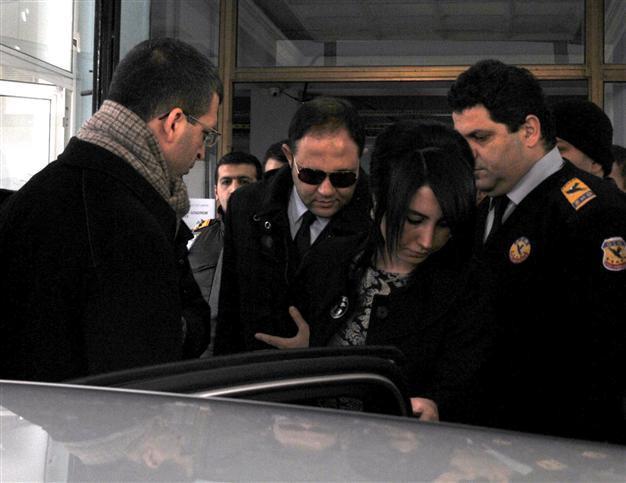No suspects left in jail in Turkey's corruption probe
ISTANBUL

Five suspects, including the former interior minister's son Barış Güler, have been released. DHA Photo
Five suspects, including the sons of two former ministers and an Iranian-born Azeri businessman, who were detained in a 2013 graft probe, were released Feb. 28 by court pending trial.
Barış Güler, the son of former Interior Minister Muammer Güler, Azeri businessman Reza Zarrab, the main suspect in the graft investigation, and the son of ex-Economy Minister Zafer Çağlayan, Kaan Çağlayan, as well as two other suspects were banned from traveling abroad by the court and will have to visit the closest police station once a week.
The court said there was no possibility that the suspects would flee or tamper with evidence, as they have official residential addresses and that all evidence related to the case had already been collected.
The suspects were released from prison on the afternoon of Feb. 28.
With the releases, there are no more suspects under arrest in the graft operation, although 24 people were arrested in the initial stages of the probe.
Barış Güler and Kaan Çağlayan were accused of facilitating bribery while Zarrab was accused of giving bribes and founding an organization to commit crime.
The release of the suspects caused a public outcry, especially among the relatives of coup plot suspects who have spent years under arrest before being convicted. “I’m looking for a volunteer to go to Silivri [prison] instead of me and look in the face of my father, who has been asking what his crime is for six years but has not been given a proper answer,” Nazlıcan Özkan, daughter of Ergenekon suspect Tuncay Özkan, wrote on her Twitter account.
Main opposition Republican People’s Party (CHP) leader Kemal Kılıçdaroğlu said the decision was not a surprise. “We said earlier that they would be released, they are trying to cover up corruption,” Kılıçdaroğlu said.
Justice Minister Bekir Bozdağ said the decision on the arrests and the releases belonged to courts. “I cannot say any more since the investigation is going on.”
Zarrab allegedly gave bribes to Barış Güler, Kaan Çağlayan, and former Halkbank General Manager Süleyman Aslan in order to facilitate the transactions of money and gold between Turkey, Iran and Russia.
Aslan, who was found to be in possession of $4.5 million in cash stashed in shoeboxes when police raided his house on Dec. 17, was released on Feb. 14.
Zafer Çağlayan and Muammer Güler were removed from the Cabinet a week after the operation in an unexpected reshuffle.
The graft probe was launched on Dec. 17, but the government has consistently denounced it as “a plot” conducted by the Fethullah Gülen community.
The government has removed hundreds of prosecutors and thousands of police officers since Dec. 17 on the grounds that the civil servants are under the control of the Gülen community.
In the meantime, prosecutors appointed to a second graft investigation, which was allegedly halted by the government, have ordered the destruction of investigation files collected after Dec. 15, daily Hürriyet has reported.
The case, which implicated several prominent businessmen and the son of the prime minister, was sensationally made public after prosecutor Muammer Akkaş announced that investigation files had been taken from his hands after he issued arrest orders.
According to Hürriyet, the new prosecutors appointed to the case have now ordered the destruction of all the evidence – including wiretappings – collected after Dec. 15, two days before the massive raids conducted as part of the initial graft operation. Barış Güler, Kaan Çağlayan and the son of another former minister were detained during the first graft raids, along with influential businessmen, rocking Turkey’s political and business landscape.
However, the Istanbul Police Department, which keeps hold of all evidence according to the law, responded that all files had been erased from the archives by the officers who were relocated in massive purges.
“It has not been possible to take any action regarding the prosecution’s demand, as the requested files were erased by the reassigned officers in total violation of archive regulations,” the police department reportedly said in internal correspondence.
The latest report comes as debate continues about whether allegedly wiretapped phone conversations between Prime Minister Recep Tayyip Erdoğan and his son, Bilal Erdoğan, which were leaked online this week, could be considered as pieces of evidence. Along with questions about whether they are authentic, the recordings need to have been conducted legally by the police in order to be considered evidence.
According to Hürriyet, if the evidence collected after Dec. 15 is destroyed by prosecutors, voice conversations allegedly recorded on Dec. 17, the day of the first graft raids, would not be able to count as evidence despite being made with a court order.
Up to 41 suspects were to be arrested in the second probe, according to investigation files obtained by the media. However, the new prosecutors appointed to the case first lifted the arrest orders before removing all asset freezes issued for the suspects by Akkaş.
Meanwhile, lawyers commenting on the orders to destroy the investigation files have suggested that this act could be considered a crime under the Turkish Penal Code.
“This seems to be an order to erase and destroy all the files, which means tampering with evidence. The institution that carries this out and the one that orders it are both committing a crime,” said lawyer Hasan Gürbüz.
